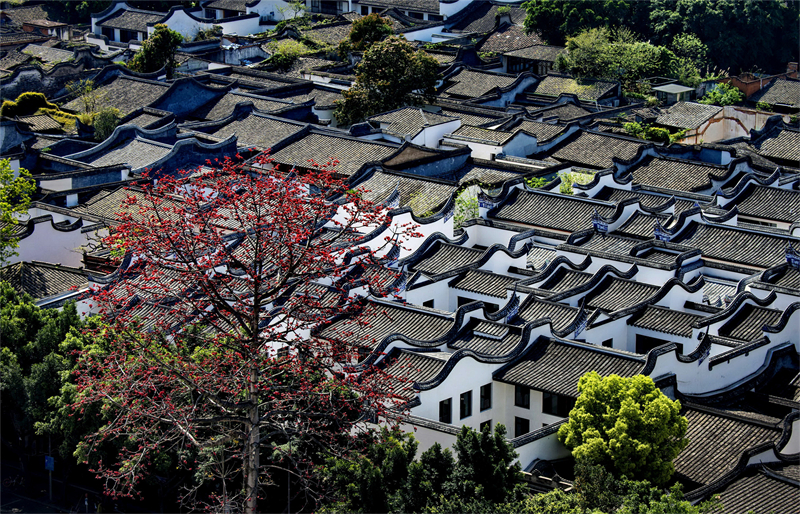


Fuzhou, briefly named Rong, is located in the eastern part of Fujian province and downstream of the Minjiang River. It is the capital of Fujian. With a total area of 12,000 square kilometers and a population of 8.5 million, Fuzhou now has six districts, one county-level city, and six counties under its jurisdiction. President Xi Jinping once affectionately said that Fuzhou is a city of blessings and Fuzhou people are fortunate people.
Fuzhou has a long history and rich cultural heritage. Fuzhou is a renowned historic and cultural city in China with a history of more than 2,200 years. It is a city of profound culture with four distinctive cultural symbols of Tanshishan Culture, Shipbuilding, Three Lanes and Seven Alleys, and Shoushan Stone. Notably, Three Lanes and Seven Alleys is listed as one of the top 10 Chinese Historical Districts and has nurtured many renowned historical figures such as Lin Zexu, Shen Baozhen, and Yan Fu.
Fuzhou boasts a prosperous economy and competitive overall strength. In 2024, the city's GDP reached over 1.4 trillion yuan with a year-on-year growth rate of 6.1%. Equipped with six 100-billion-yuan industrial clusters including textile and chemical fiber, light and food industry, machine manufacturing, metallurgy and building materials, electronic information and energy, Fuzhou has now become one of the country's southeast coastal cities with high-level industrial agglomeration and well-developed supporting facilities.
Fuzhou enjoys convenient transportation and geographical advantages. Located in the southeastern part of China, Fuzhou faces Taiwan and is adjacent to Hong Kong and Macao, having a close relationship with Southeast Asian countries. Fuzhou has built a multidimensional and multifunctional traffic network covering sea, land, and air transportation. The expressway network enables travel to any other city within Fujian province in under four hours. The Changle International Airport now runs 115 domestic and international air routes, connecting Fuzhou with 96 destinations globally.
Fuzhou is close to Taiwan and home to many overseas Chinese and boasts a high level of openness. It is the provincial capital in the Chinese mainland that is closest to Taiwan, with Huangqi Peninsula situated less than 8,000 meters away from Mazu Island. Moreover, there are more than 800,000 people of Fuzhou origin living in Taiwan. At the same time, Fuzhou is a well-known ancestral home of overseas Chinese, as over 4.6 million overseas Chinese are from Fuzhou, living and working in 177 countries and regions worldwide. Fuzhou is developing a new pattern of opening up in all aspects and has established friendship city relationship with 24 cities of 17 countries in 5 continents around the globe.
Fuzhou has beautiful scenery and a pleasant ecological environment. With a forest coverage rate of 51.77 percent, Fuzhou is one of the greenest cities in China, ranking among the top in all Chinese provincial capitals. It is also one of the cities with the best air quality, ranking fifth among major cities in China.
Fuzhou enjoys multiple preferential policies and broad development prospects. In August 2015, the State Council approved the establishment of Fuzhou New Area, giving it the strategic positioning as an important platform for cross-Strait exchanges and cooperation, an important gateway for opening up, a modern industrial base along the southeast coast, a demonstration area for reform and innovation, and a pioneering area for ecological conservation. As the 14th national-level new area in China and the only one in Fujian, Fuzhou New Area has a planning area of 800 square kilometers and is located in the coastal area of Fuzhou. It involves 26 towns (subdistricts) in Cangshan, Mawei, and Changle districts, as well as Fuqing city, covering seven national and three provincial development zones. The Fuzhou Area of Fujian Pilot Free Trade Zone is within this new area, serving as a new engine and a new growth pole to drive regional coordinated development. In October 2021, a 291-square-kilometer direct management zone and a 509-square-kilometer co-construction zone were established. Part of Changle district is managed under the direct management zone framework, promoting integration between the new area, the FTZ, and Changle district to accelerate high-quality development.
In addition to the Fuzhou New Area, the city has also been designated as the Core Area of the 21st-Century Maritime Silk Road, the Fuzhou Area of Fujian Pilot Free Trade Zone, an Ecological Civilization Pilot Zone, an Independent Innovation Demonstration Zone, and a Demonstration Zone for Marine Economy Development. These overlapping national policy initiatives have yielded increasing benefits. In recent years, Fuzhou has rolled out a comprehensive policy system to support the real economy, including 36 targeted measures for promoting the development of the private sector.

